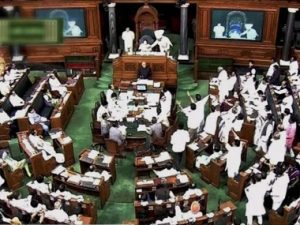
10-12-2016 (Important News Clippings)
To Download Click Here
मौलिक कर्तव्य पर मुहर
हाल ही में सुप्रीम कोर्ट ने आदेश दिया कि देश के सभी सिनेमाघरों में फिल्म दिखाने से पूर्व राष्ट्रगान बजाया जाए। इसको लेकर न्यायविदों और राजनीतिक विश्लेषकों के बीच एक देशव्यापी बहस छिड़ गई है। उनमें से कई कह रहे हैं कि कोर्ट ने स्वयं अपनी सीमा लांघ ली है और ऐसा रुख अपना लिया है जो नागरिकों के मौलिक अधिकारों का उल्लंघन करता है। उनमें से कई तो यहां तक कह रहे हैं कि इस आदेश को लागू करना कठिन हो सकता है। आलोचकों का मत है कि राष्ट्रगान के प्रति सम्मान प्रकट करना एक बात है और देश के प्रत्येक सिनेमाघरों में इसे बजाने के लिए जोर देना बिल्कुल दूसरी बात।
हालांकि इस तर्क में कुछ दम हो सकता है कि इस हद तक आगे बढ़कर कोर्ट को देश के हर सिनेमाघर में फिल्म दिखाए जाने से पहले राष्ट्रगान बजाने संबंधी आदेश देने की जरूरत नहीं थी, लेकिन अदालत के आदेश को हाल के वर्षों में सामने आए इस गहन राजनीतिक विमर्श के आईने में देखा जाना चाहिए जिसके तहत नागरिकों का एक हिस्सा दावा करता है कि उनका धर्म भारत को मातृभूमि के रूप में स्वीकारने या राष्ट्रगान को गाने से रोकता है। बहरहाल यह आदेश इसलिए भी महत्वपूर्ण है, क्योंकि यह नागरिकों के मौलिक कर्तव्यों पर बल देता है।सुप्रीम कोर्ट के आदेश में कहा गया है कि देश के सभी सिनेमाघर राष्ट्रगान बजाते समय परदे पर राष्ट्रीय ध्वज दिखाएं। हॉल में मौजूद सभी लोग उस दौरान खड़े हों और राष्ट्रगान के प्रति सम्मान प्रकट करें। यह विचार राष्ट्रीय पहचान, राष्ट्रीय अखंडता और संवैधानिक देशभक्ति के मूल में निहित है। अदालत के अनुसार राष्ट्रगान और राष्ट्रीय ध्वज के लिए सम्मान मातृभूमि के लिए प्रेम और आदर को दर्शाता है और यह देशभक्ति और राष्ट्रवाद की भावना को मन में बैठता है।
सर्वोच्च न्यायालय ने तो कुछ बातें राष्ट्रगान के प्रति सम्मान प्रकट करने के मुद्दे पर पूर्व में दिए गए अपने फैसलों से अलग हटकर भी कहीं। 1985 में जेहोवाह विटनेस नामक संप्रदाय से संबंधित तीन बच्चों को राष्ट्रगान गाने से इंकार करने के चलते केरल में एक स्कूल से निकाल दिया गया था। स्कूल परिसर में जब राष्ट्रगान गाया जा रहा था तब दूसरे बच्चों के बीच वे तीनों छात्र सम्मानपूर्वक मौन मुद्रा में खड़े रहे, लेकिन राष्ट्रगान गाने से मनाकर दिया, क्योंकि ऐसा करना उनके धार्मिक आस्था के सिद्धांतों के खिलाफ था। जब उनकी अपील हाईकोर्ट से खारिज हो गई तब वे सुप्रीम कोर्ट गए। इस केस (बिजोए एमानुएल तथा अन्य बनाम केरल राज्य तथा अन्य) में कोर्ट ने अनुच्छेद 19 (1) (क) और 25 (1) के तहत छात्रों के मौलिक अधिकारों के उल्लंघन को देखते हुए निष्कासन के आदेश को हटा लिया, क्योंकि उनकी धार्मिक आस्था उन्हें राष्ट्रगान में भाग लेने की अनुमति नहीं देती है।
कोर्ट ने कहा था कि जेहोवाह विटनेस द्वारा लिया गया रुख भारत के लिए अनूठा नहीं है। दूसरे देशों में इस संप्रदाय के सदस्य वोट देने, सार्वजनिक कार्यालयों में काम करने या सशस्त्र सेना में सेवा देने से भी इंकार करते हैं। वे राष्ट्र ध्वज को नमन करने, राष्ट्रगान बज रहा हो तो खड़े होने या निष्ठा की शपथ लेने से मना करते हैं, क्योंकि उनकी धार्मिक आस्था उन्हें ऐसा करने से रोकती है। अदालत ने कहा कि एक सच्चे लोकतंत्र की असली परीक्षा यह है कि एक महत्वहीन अल्पसंख्यक भी देश के संविधान में अपनी पहचान सुनिश्चित कर सके। अनुच्छेद 25 की व्याख्या में इस बात को ध्यान में रखा जाना जरूरी है। कोर्ट ने राष्ट्रगान के सम्मान के लिए मौलिक कर्तव्य के पहलुओं को भी छुआ और कहा कि जब राष्ट्रगान गाया जाता है और जब एक व्यक्ति खड़ा होता है तब वह उसके प्रति सम्मान व्यक्त करता है। यह कहना सही नहीं होगा कि राष्ट्रगान के गायन में भाग नहीं लेने से वह उसके प्रति अनादर व्यक्त करता है।
नागरिकों के मौलिक कर्तव्यों के संबंध में मौजूदा आदेश पारित करने वाली बेंच का विचार एमानुएल मामले की सुनवाई करने वाली बेंच के विचार से भिन्न था। हालिया आदेश में कोर्ट ने मौलिक कर्तव्यों की बात करने वाले संविधान के अनुच्छेद 51 (अ) (क) का हवाला दिया, जिसके अनुसार भारत के प्रत्येक नागरिक का यह कर्तव्य होगा कि वे संविधान का पालन करें और इसके आदर्शों और संस्थाओं, राष्ट्र ध्वज और राष्ट्रगान का आदर करें। बेंच ने कहा कि संविधान में निहित आदर्शों का पालन करना प्रत्येक नागरिक का पवित्र दायित्व है।
एमानुएल मामले में कोर्ट ने इतनी सख्ती नहीं दिखाई थी। तब उसने कहा था कि जब राष्ट्रगान गाया जाता है और एक व्यक्ति खड़ा होता है तब यह राष्ट्रगान के प्रति उचित सम्मान होता है। यह कहना सही नहीं होगा कि गायन में भाग नहीं लेना राष्ट्रगान का अनादर है। यह तथ्य है कि भारत न केवल दुनिया का सबसे बड़ा लोकतंत्र है, बल्कि विश्व का सबसे विविध राष्ट्र भी है। एक बात दिमाग में रखनी होगी कि यहां राष्ट्रध्वज, राष्ट्रगान और देश का संविधान सभी नागरिकों के लिए सेक्युलरिज्म का एकमात्र आधार है। विविधता को बढ़ावा देने के लिए विभिन्न समूहों और समुदायों के लिए और भी दूसरे ध्वज, गान, किताबें और प्रवृति हैं। कोई भी व्यक्ति या समूह जो हमारे राष्ट्रगान के प्रति अनादर प्रकट करने या कम आदर प्रकट करने के लिए धर्म का हवाला देता है तो वह भारत की एकता और अखंडता की जड़ पर प्रहार करता है और उसे हतोत्साहित किया जाना चाहिए। यदि अभिव्यक्ति की आजादी और धर्म मानने की आजादी जैसी व्यक्तिगत आजादी को नागरिक के कर्तव्य से ज्यादा महत्व दिया जाएगा तो यह हमारी विविधता की भावना के लिए हानिकारक होगा।
कुछ विश्लेषक हमें यह भरोसा दिलाएंगे कि हमारे संविधान में मौलिक कर्तव्यों का भाग अप्रवर्तनीय या लागू होने योग्य नहीं है और इस प्रकार इसका कोई मूल्य नहीं है। भारत की विविधता, इसके आदर्शों और संस्थाओं पर बाहरी ताकतों के दबाव को देखते हुए इस तर्क को चुनौती देने की जरूरत है। विभिन्न धार्मिक और सामाजिक समूह हमारे उन संवैधानिक मूल्यों का दमन कर रहे हैं जो हमें एकता के सूत्र में बांधते हैं। इस परिदृश्य में धार्मिक और अभिव्यक्ति की आजादी के तर्क को नकारने की जरूरत है। अपने हालिया आदेश में मौलिक कर्तव्यों के संदर्भ में शीर्ष अदालत की टिप्पणी का स्वागत होना चाहिए, क्योंकि इससे यह उम्मीद मजबूत होती है कि अदालत संविधान के इस भाग को जीवंत बनाए रखेगी। मौलिक कर्तव्य सभी नागरिकों को समान राष्ट्रीय लक्ष्यों की ओर अग्रसर होने में सक्षम बनाते हैं और दुनिया के सबसे विविध राष्ट्र को एकता के सूत्र में बांधे रखते हैं। शायद अब एमानुएल फैसले के दौरान की गई टिप्पणियों पर पुनर्विचार करने का समय आ गया है।
[ लेखक ए. सूर्यप्रकाश, प्रसार भारती के अध्यक्ष और जाने-माने स्तंभकार हैं ]
Accounting for natural capital
Biodiversity integration into developmental plans is crucial for sustainable development

Biodiversity is a unique and a critical asset which is under pressure due to anthropogenic reasons, and there is a need for its mainstreaming. Biodiversity once lost is lost forever.Biodiversity means the variability among living organisms from all sources including terrestrial, marine and other aquatic ecosystems. The diversity includes variability within species (genetic diversity) as well as between species (species diversity) and ecosystems (ecosystem diversity). It provides services such as water purification and supply, waste assimilation and the cleaning of air and water, regulation of pests and diseases, and soil nutrient cycling and fertility. Biodiversity helps mitigate unpredictable global changes and natural disasters. A rich biodiversity is the basis for good health, food security, economic growth, livelihood security and moderation of climatic conditions. The annual contribution of biodiversity to the world is put at $33 trillion.
Many ecosystem or biodiversity goods and services act as a safety net to indigenous peoples, poor and vulnerable groups, women and children. More than 70 per cent of the world’s poor live in rural areas and are directly dependent on the ecosystem/biodiversity goods and services for their survival.
The Indian scenario
India, one of the 17 mega-diverse countries, is rich in biodiversity and its associated traditional knowledge systems which have been gathered from times immemorial. Due to its sheer size, range of topography, altitude and climate, India exhibits a rich variety of ecosystems such as forests, grasslands, deserts, wetlands, mangroves and coral reefs. These provide basic needs such as food, fibre, medicine, fodder, fuel wood and timber. Around 1.2 billion people coexist with 8 per cent of recorded species, which includes over 45,000 species of plants and 91,000 species of animals. India’s tribal population is also dependent on forests and natural resources to a significant extent.
Mainstreaming biodiversity
India possesses around 18 per cent of the world’s population, but only 2.4 per cent of land and 4.2 per cent of water resources. To achieve a high GDP growth rate, rapid development that pertains to industry and infrastructure is required. But our developmental activities are greatly affecting biodiversity. Natural resources such as water, forests, fisheries and marine resources are being overexploited, which in turn affects their renewability. A recent study shows that India will become water scarce by 2025. Emissions from industry and the transport sectors are at a high level. There is also indiscriminate discharge of solid wastes, industrial effluents and domestic sewage with considerable impact. Therefore, proactive efforts in ecosystem management that involve government and community are needed.
Economic sectors such as agriculture, fisheries, forestry, health, nutrition, water supply, energy, trade, industry, transport and tourism depend on biodiversity and impact biodiversity.Biodiversity conservation has traditionally been the responsibility of the environment sector, and undertaken through measures such as the enforcement of legal decisions, ‘polluters pay principles’ as well as the incorporation of protected areas. As the developmental sector generally ignores its responsibility towards biodiversity conservation, a more responsible approach towards biodiversity management, by mainstreaming, is needed.
Mainstreaming or inclusion means integrating/including actions related to conservation and promoting the sustainable use of biodiversity in strategies relating to production sectors such as agriculture, fisheries, forestry, tourism, and mining. It also refers to including biodiversity considerations in poverty reduction and national sustainable development plans. Mainstreaming helps to reduce the negative impacts on biodiversity. For example, in agriculture, strategies to minimise the use of and optimise the application of chemical fertilizers and pesticides reduce negative impacts on soil, groundwater, surrounding habitats and wildlife.
Small-scale farming or aquaculture activities undertaken in a sustainable manner might prove to be a relief to wild species. Positive biodiversity impacts might also be optimised through promoting people’s access to benefits derived from the use of biological resources. Community-based joint forest management, promotion of traditional multi-species and multi-variety agricultural practices, securing access to medicinal resources for local use, strengthening traditional and cultural practices, and governing the use of wild resources are examples.
Further, the fair and equitable sharing of the benefits arising out of the use of biological resources and the knowledge associated thereto (one of the objectives of the Convention of Biological diversity, or CBD, and the Biological Diversity Act of India) by users (industries) to the providers (communities) act as incentives to local communities in the conservation and sustainable use of bio-resources.
What is needed
It is clear that to achieve many national and international biodiversity goals such as the National Biodiversity Strategies and Action Plans and the Aichi Biodiversity Targets, as well as meet CBD objectives, biodiversity integration into developmental sectors is a prerequisite. After understanding its relationship with biodiversity, each sector should come up with appropriate mechanisms for conservation and sustainable biodiversity use.
The active involvement of Central/State Ministries and Departments is needed. Further, research institutions need to chip in and come up with appropriate management strategies, with budget options. Public and private entrepreneurs and entities as well as the public need to come forward to mainstream biodiversity. (The statistical references mentioned in this article are from various published reports.)
Dr. Prakash Nelliyat works with the National Biodiversity Authority, Chennai. The views expressed are personal.
Date: 09-12-16
Are MLAs delegates or trustees?

Three categories
The most important provision of the 1985 law, which was amended in 2003, states that those legislators who voluntarily give up the membership of a political party or defy the party whip in case of a trust vote are bound to be disqualified. In light of this provision, defections can be classified into three types or categories.
One, in certain cases, legislators as a ‘faction’ quit membership of a political party or defy the party whip and join another political party. But as per the law there is a numerical criterion for such ‘rebel MLAs’ to legitimately join another political party and avoid disqualification; two-third of the members of the legislature party must support the decision. For example, the events which unfolded in Arunachal Pradesh facilitated the merger of 43 ‘rebel’ Congress MLAs with the People’s Party of Arunachal.
Two, MLAs often defect to other parties in pre-election season, as we are seeing in Uttar Pradesh and Punjab. By political wisdom, such defections are usually indicative of the direction of the electoral wind. The law in these cases becomes redundant as even if MLAs are disqualified, the date for seeking a fresh mandate is often merged with the upcoming Assembly election.
Our primary concern is with the third type of defections: MLAs defecting toward the ruling party after a new electoral mandate has been delivered. The three States of West Bengal, Telangana and Andhra Pradesh have seen legislators joining the ruling party after a new round of elections held in 2016 and 2014, respectively. Legislators often argue that defection is a matter of choice and as individuals they have a right to decide who to support. This bring us to the fundamental dilemma of political representation faced by all electoral democracies — how should the political representative function in the public policy process? Does the representative have an individual choice which he/she can exercise or is he/she always bound to the preferences of his/her constituents?
Political theory has reflected on this dilemma as a conflict between a ‘delegate’ and a ‘trustee’. The trustee notion of political representation was advocated by James Madison and it underlines the function of the legislator to represent the views of his constituency in the public policy process. On the other hand, the delegate notion advocated by Edmund Burke argues that that a political representative should follow his or her own judgment as to what should be the best course of action. Thus, adhering to the delegate notion, several democracies have not adopted an anti-defection law, even though legislators often become turncoats and switch to the other side. In the U.K., Australia and the U.S., parliamentarians and senators often take positions contrary to their parties or vote against the party’s view, yet continue within the same party. The rationale behind this draws from the delegate argument that legislators should be allowed to express their own views and a defection law amounts to curtailment of the delegate’s freedom of choice.
The difference in India
Even in India, several commentators have highlighted the irrelevance of the anti-defection law and called for reconsideration of such a legal provision. This brings us to the aforementioned dilemma and the relationship between representatives and their constituents. However, India is an exception to this relationship prevalent in Western democracies as political representatives represent their respective political parties rather than electoral constituents. This can be explained by the fact that voters tend to vote for political parties rather than candidates. Evidence from surveys conducted at CSDS show that for Indian voters, the political party is the most important consideration vis-à-viscandidates while casting their ballot.
Thus, unlike Western democracies, India enacted the anti-defection law to tackle political turncoats; otherwise it would lead to a violation of the people’s mandate. But there seem to be variations in the effective implementation of this law as the decision to disqualify a legislator is contingent on the institution of the Speaker. The partisan role of the Speaker in many States has ensured the continuation of turncoat legislators as legitimate members of the House. This is a good time to heed the advice of eminent constitutional experts and scholars to amend the anti-defection law and rest the authority to disqualify turncoats in the hands of an autonomous body.
Souradeep Banerjee is a Researcher with Lokniti, a research programme of the Centre for the Study of Developing Societies (CSDS). Sanjay Kumar is Professor at and currently the Director of CSDS. Views are personal.


